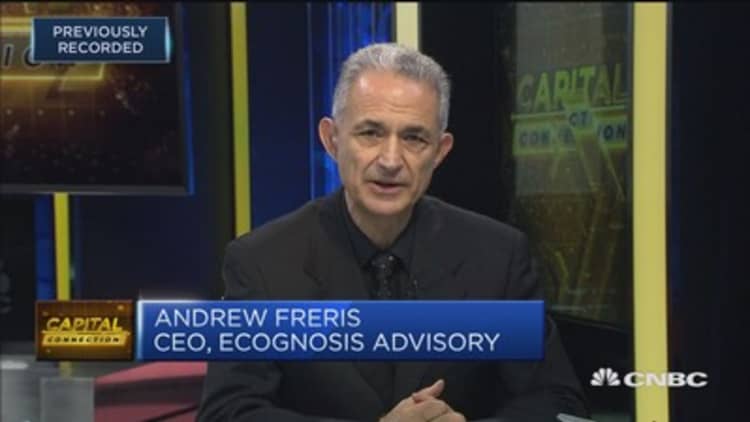
President Donald Trump "flip-flops" so much on his stance over trade and tariffs with China that it's difficult to know what stocks to buy and avoid, an economist told CNBC ahead of the next round of Sino-U.S. trade talks aimed at averting a trade war.
"The president has an uncanny habit of saying 'yeah, yeah we'll punish you' and then 'no, no we won't," Andrew Freris, chief executive of economic and financial advisory firm Ecognosis Advisory, told CNBC Thursday.
"So it's very difficult to buy and sell anything when the flip-flops are so prominent," Freris added, although he suggested avoiding tech stocks, which could be the worst hit if a trade war and tariffs between China and the U.S. are followed-through.
"I'd prefer to look at the overall macro (picture) and the pricing of stocks rather than anything else," he said.
Freris' comments come as the U.S. and China are set to start another round of trade talks on Thursday. The atmosphere could be a little frosty given a war of words and threats over trade tariffs in recent weeks.
Trump has criticized what he sees as unfair trade practices and threatened to impose up to $150 billion of tariffs on Chinese goods. China said it would retaliate by putting tariffs on a long list of key American exports, ranging from soy beans to orange juice and cranberries.
Freris, an economist and strategist formerly in the investment banking sector, said China would not lose in a potential trade war.
"In the case of China, China was never an export-driven economy and China is not an export-driven economy, I will never tire of repeating that," he told CNBC's Capital Connection.
"So even if a lot of exports disappear it will have a tiny affect on its GDP (gross domestic product) growth. It will affect individual companies, of course, and it will affect some of the regions, but taking China macro-economically — if the Americans think that barking loud enough that's going to scare them, they won't."
On Thursday, Treasury Secretary Steven Mnuchin, Commerce Secretary Wilbur Ross and U.S. Trade Representative Robert Lighthizer are leading the U.S. delegation in discussions with Chinese Vice Premier Liu He. White House trade and manufacturing advisor Peter Navarro, a vocal critic of China trade policies, appears to have been sidelined for the visit.
China's Commerce Ministry said it did not want to see an escalation to the trade dispute, Reuters reported Thursday, and added that it hoped the U.S. would take action as soon as possible on the case of Chinese technology company ZTE and resolve it in a fair manner, ministry spokesman Gao Feng told reporters at a regular briefing.
Ahead of this week's talks, Trump said Sunday that he would help ZTE "get back into business, fast" after a U.S. ban hit the company hard, but following criticism that his views on ZTE contradicted his broader stance towards China-U.S. trade, he appeared to row back on that, tweeting on Wednesday that, "Nothing has happened with ZTE except as it pertains to the larger trade deal."



